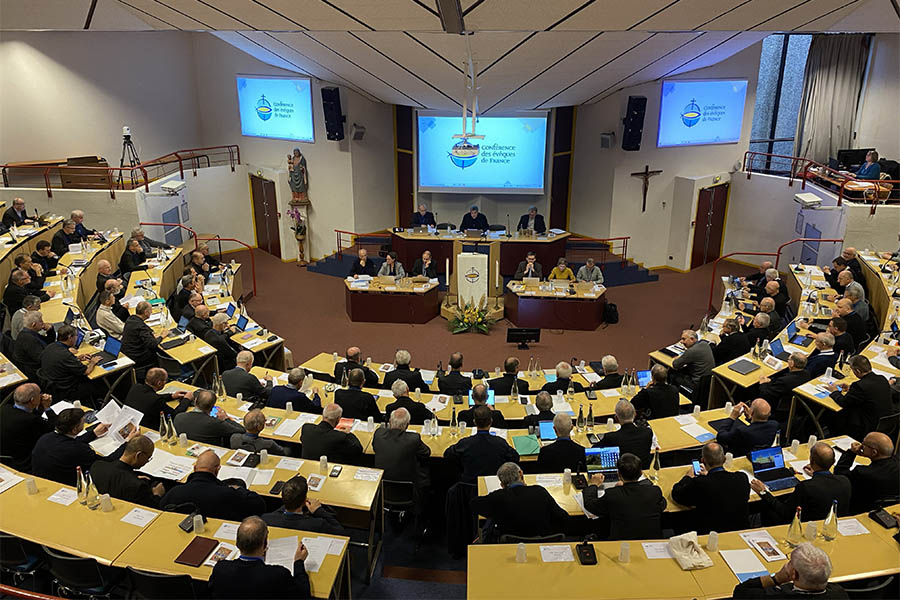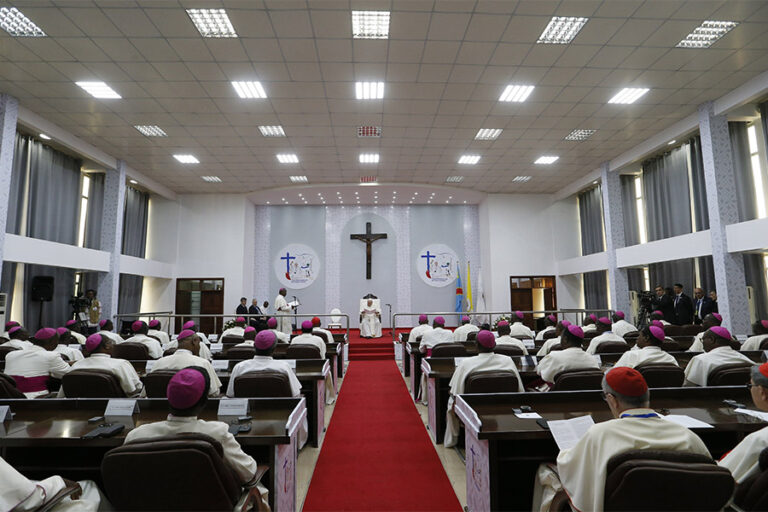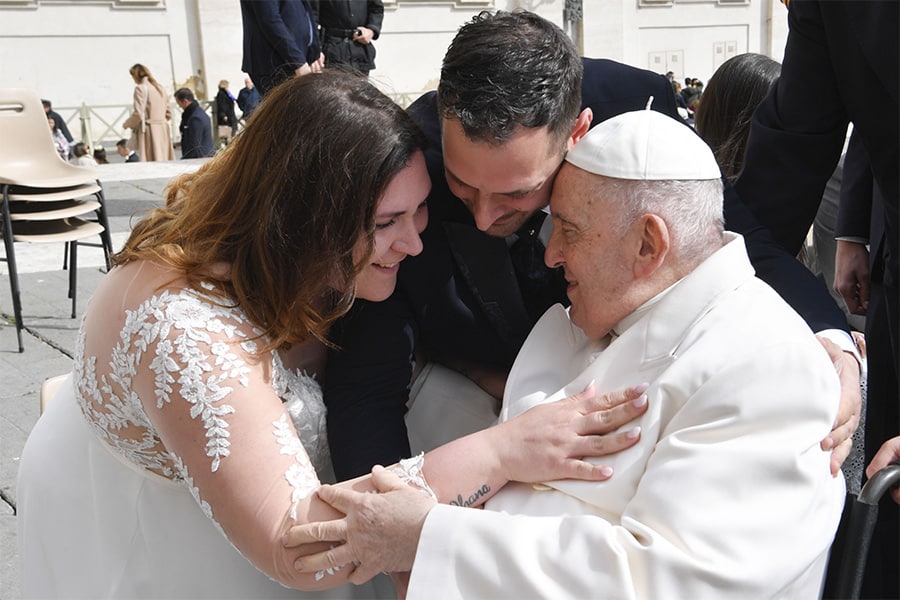ROME (OSV News) — Citing cultural differences and doctrinal confusion, the bishops’ conferences across Africa ruled that same-sex blessings will not be carried out in the continent.
Meanwhile, the French bishops’ conference gave a green light to “generously bless” same-sex couples, furtherly generating a clear line between Western countries and the global south in their reception of a bombshell declaration issued Dec. 18.
In a statement released Jan. 11, Cardinal Fridolin Ambongo of Kinshasa, Congo, president of the Symposium of Episcopal Conferences of Africa and Madagascar, or SECAM, said the decision to not bless homosexual couples was made in agreement with Pope Francis and Cardinal Victor Manuel Fernández, prefect of the Dicastery for the Doctrine of the Faith.
“We, the African Bishops, do not consider it appropriate for Africa to bless homosexual unions or same-sex couples because, in our context, this would cause confusion and would be in direct contradiction to the cultural ethos of African communities,” he said.

On Jan. 10, the Permanent Council of the French bishops’ conference said the Vatican declaration is “an encouragement to pastors to generously bless those who come to them humbly asking for God’s help,” to “accompany them on their journey of faith, so that they discover God’s call in their own lives and respond to it concretely.”
“Fiducia Supplicans” (“Supplicating Trust”) — subtitled “On the pastoral meaning of blessings” — stated that Catholic priests could bless a same-sex or other unmarried couple. However, it cannot be a formal liturgical blessing, nor give the impression that the church is blessing the union as if it were a marriage.
While several bishops in Western countries praised the document, others expressed concern or even barred the implementation of the declaration in their dioceses, particularly in Africa.
Among the first to oppose the document’s proposals were the bishops of Malawi. The day after the Vatican declaration was published, the Malawian bishops’ conference banned the blessing of same-sex unions to “avoid confusion among the faithful.”
Guinean Cardinal Robert Sarah, former prefect of the Congregation for Divine Worship, also expressed his dismay at the declaration’s release in a Jan. 8 statement published on the Settimo Cielo blog.
“It is precisely confusion, lack of clarity and truth, and division that have troubled and overshadowed this year’s Christmas celebration,” Cardinal Sarah wrote.
He also criticized bishops who support same-sex blessings, accusing them of “generating errors, scandals, doubts and delusions.”
Some bishops sow “doubt and scandal in the souls of the faithful, pretending to bless homosexual unions as if it were legitimate, in conformity with the nature created by God, as if it could lead to holiness and joy,” the cardinal said.
“These bishops ignore or forget Jesus’ severe admonition against those who scandalize the little ones.”
Congolese Cardinal Ambongo echoed similar sentiments in his SECAM statement, which he said was “a consolidated summary of the positions adopted by various national and inter-territorial Episcopal Conferences across the African continent.”
“Within the Church family of God in Africa, this declaration has caused a shockwave, it has sown misconceptions and unrest in the minds of many lay faithful, consecrated persons and even pastors and has aroused strong reactions,” he wrote.
Expressing the African bishops’ “unwavering attachment to the Successor of Peter,” Cardinal Ambongo said that although the document reaffirms church teaching on marriage, its approval of same-sex blessings “could blur the definition of marriage.”
Such rites and prayers, he said, “are considered as unacceptable.”
In France, the Permanent Council’s statement — signed by 10 leading French bishops, including the president and vice presidents of the bishops’ conference — said that while the teaching on marriage remains unchanged, “we also receive from Jesus Christ the call to an unconditional and merciful welcome, since Jesus ‘did not come to call the righteous but sinners,'” citing the Gospel of Mark.
“Fiducia Supplicans reminds us that those who are not in a position to commit themselves to the sacrament of marriage are not excluded from God’s love or from his Church.” Instead, it “encourages them in their desire to approach God to benefit from the comfort of his presence, and to implore the grace to conform their lives to the Gospel.”
At the start of the year however, nine bishops of the Archdioceses of Rennes published their own statement to explain “Fiducia Supplicans.” In a Jan. 1 document, issued on behalf of the bishops from the Ecclesiastical Province of Rennes, they recommended to their priests that they bless homosexuals “individually,” but not as couples.
“It was not about expressing reserve in the face of ‘Fiducia Supplicans,'” Bishop Denis Moutel of Saint-Brieuc, one of the signatories of the document, told OSV News. “It was a question of clarifying it, taking into account the context of French society, which today can distort the reception of ‘Fiducia Supplicans’ and be misleading.”
In France, demands for the legal recognition of same-sex unions were virulent in the 2010s. They culminated in a law passed in 2013 — legally authorizing same-sex marriages. Today, associations such as “SOS homophobie” continue to be active in campaigning for greater social recognition of homosexuals in France, including in public schools.
“Because of these demands, it is appropriate to make things clear in France,” Bishop Moutel told OSV News. “The church has been given the mission of announcing the joy of married love experienced in marriage by couples of different sexes,” Bishop Moutel added.
“But the church also recognizes that there is good in what people are experiencing, even if it does not validate their choices. What ‘Fiducia Supplicans’ recommends is not an approval, still less a consecration, but a blessing of charity and growth,” the French bishop said.
“‘Fiducia Supplicans’ is above all a text of pastoral charity, which does not deserve such a storm,” Bishop Moutel told OSV News.
“The pastoral charity that the church must exercise is based on the fact that no one can be kept apart from God’s great love for everyone,” he said, adding he blesses homosexual individuals, and also couples, as long as “it is clear to them that this is not an endorsement by the church, and even less a consecration of their union.”
In Africa, reiterating the Catechism of the Catholic Church’s teaching that homosexual acts are “intrinsically disordered” and “contrary to the natural law,” Cardinal Ambongo said that the African bishops’ conferences preferred “not to offer blessings to same-sex couples.”
“This decision stems from concern about potential confusion and scandal within the church community,” he said.
Furthermore, he added, “the cultural context in Africa, deeply rooted in the values of the natural law regarding marriage and family, further complicates the acceptance of unions of persons of the same sex, as they are seen as contradictory to cultural norms and intrinsically corrupt.”
He also said the language used in the Vatican declaration “remains too subtle for simple people to understand,” and thus, is open to misunderstandings or misinterpretations.
Cardinal Ambongo concluded his statement by urging Christian communities to not “allow themselves to be shaken” by the declaration.
The reaction to “Fiducia Supplicans” by several bishops’ conferences around the world prompted the Dicastery for the Doctrine of the Faith to issue a clarification Jan. 4 signed by Cardinal Fernández and Msgr. Armando Matteo, secretary of the dicatery’s doctrinal section.
Calling the negative statements by some bishops’ conferences as “understandable,” the dicastery said the statements “cannot be interpreted as doctrinal opposition, because the document is clear and definitive” on the church’s teaching on marriage and sexuality.
The dicastery also said that cultural considerations must be made when applying the declaration’s proposal, especially in countries where homosexuality is outlawed.
This is the case of many African countries.
“If there are laws that condemn the mere act of declaring oneself as a homosexual with prison and in some cases with torture and even death, it goes without saying that a blessing would be imprudent,” the DDF statement said.
This story was co-authored by Junno Arocho Esteves and Caroline de Sury, who write for OSV News from Rome and Paris, respectively.
Read More Marriage & Family Life
Copyright © 2024 OSV News








